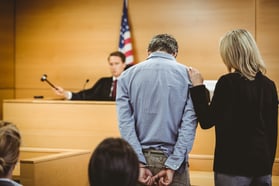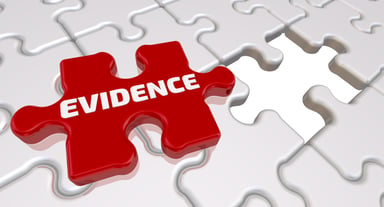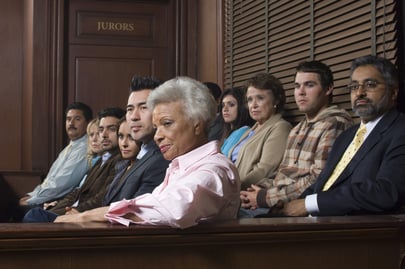When Is the Right Time to Contact a Sex Crime Attorney?
The Right Time is Now
 You hear from a friend or relative that someone is accusing you of sexual misconduct. Wait a minute you tell yourself, that was over twenty years ago. Or maybe you say to yourself, I know I am innocent, and I am sure that the truth will come out and I will not be harmed. Therefore, no need to call a lawyer. Right? Wrong!
You hear from a friend or relative that someone is accusing you of sexual misconduct. Wait a minute you tell yourself, that was over twenty years ago. Or maybe you say to yourself, I know I am innocent, and I am sure that the truth will come out and I will not be harmed. Therefore, no need to call a lawyer. Right? Wrong!
The best time to contact an expert sex crime attorney is the moment you learn of an accusation.
Long prison sentences and even life in prison based on false accusations are more common than you can believe. These false allegations generally have their origin in divorce and child custody proceedings, parent-child discipline (such as the removal of an iPhone from a child or teen), alleged date rape scenarios, and encounters involving prostitution.
The system is rigged against the accused by generations of brainwashing by the media powered by so-called advocacy groups and false syndrome proponents (think “rape syndrome,” “child sexual abuse accommodation syndrome,” and “recovered memory syndrome”). Prosecutors hire junk science experts to testify regarding these so-called syndromes to explain away delays in reporting and inconsistency in the testimony of accusers as “myths” as courts unbelievably allow. Unfair laws have made it very difficult to win acquittals and long prison terms for convictions. For more on this, please watch our informative video, Countering Group Think Prejudice Against Criminal Defendants)
Therefore, you need a strong advocate with extensive expertise and experience in the sex crime arena to guide you through this life-devastating minefield.
The Accusation Hits
 The most ideal time to contact a sex crime lawyer is the moment you hear an accusation. True, you have not been arrested and you may have no reason to suspect authorities are, as yet, involved. Nevertheless, a sex crime attorney can help you make correct decisions that will preserve your defenses and stop you from making mistakes that will significantly hurt your case down the road.
The most ideal time to contact a sex crime lawyer is the moment you hear an accusation. True, you have not been arrested and you may have no reason to suspect authorities are, as yet, involved. Nevertheless, a sex crime attorney can help you make correct decisions that will preserve your defenses and stop you from making mistakes that will significantly hurt your case down the road.
This includes talking to the police and falling for “pretext” phone calls. What are these and why are they important to avoid? Read on!
The Investigation Is Launched
One of the worst mistakes an accused individual can make is speaking to law enforcement. This is because law enforcement has become part of the “justice” machinery that presumes those accused of sex crimes are guilty, notwithstanding your constitutional right to the presumption of innocence.
because law enforcement has become part of the “justice” machinery that presumes those accused of sex crimes are guilty, notwithstanding your constitutional right to the presumption of innocence.
Long ago, most police agencies gave up on efforts to uncover the actual facts. Now, they are now interested in obtaining evidence of your guilt. Ideally (for them), your “confession” (we put confession in parenthesis because no matter what you say, it will be twisted into a confession). This is generally done in one of two ways.
First, you may be contacted by an investigator who may tell you they just want to “chat” to “clear up the matter.” It is a trap. You will be subjected to a harsh and deceptive interrogation using something called the Reed Method. Please watch our informative video on Police Interrogations. Once this has happened, an experienced sex crime attorney may be your only hope of having your statements to law enforcement excluded as trial evidence based on potential violation of your constitutional rights.
The second way law enforcement has to obtain your “confession” is known as a “pretext call.” In this scenario, the accessor, family member, or “friend” phones you and engages you in a discussion of the accusation. The caller may say if you only apologize, this will all go away. Again, it is a trap. The police are recording it to devastating effect when played before a jury. If this happens, you need to state that you “have done nothing wrong” and hang up. Hopefully, by this time, you have still not done anything to damage the case for your innocence. This is the time to immediately contact an experienced sex crime attorney.
The Arrest Is Made
 If arrested, the matter has become exponentially more serious and more dangerous, especially if you fail to invoke your right to be represented by an attorney or at least your right to remain silent (commonly known as your Miranda rights based on a famous United States Supreme Court case by the same name). Now it may be up to your family to find the right attorney for you as you may be stuck in jail in a high bail or no bail situation.
If arrested, the matter has become exponentially more serious and more dangerous, especially if you fail to invoke your right to be represented by an attorney or at least your right to remain silent (commonly known as your Miranda rights based on a famous United States Supreme Court case by the same name). Now it may be up to your family to find the right attorney for you as you may be stuck in jail in a high bail or no bail situation.
An experienced sex crime attorney will have a bail bond company that may be able to arrange a bond at substantially below the going 10% rate. Moreover, an experienced sex crime attorney will know how to bring an effective motion for review of bail if and when it becomes necessary.
The Litigation Commences
If you already have an ongoing case, you are most likely represented, perhaps by a public defender. While public defenders are generally competent attorneys, they handle tens, if not hundreds, of cases at the same time. Therefore, a public defender may not have the time and resources available to prepare your defense like an experienced sex crime attorney with a properly trained team of paralegals, investigators, and experts.
While public defenders are generally competent attorneys, they handle tens, if not hundreds, of cases at the same time. Therefore, a public defender may not have the time and resources available to prepare your defense like an experienced sex crime attorney with a properly trained team of paralegals, investigators, and experts.
The prosecution and defense of a sex charge is a difficult time-consuming, and often costly process.
Arraignment
After arrest, the first step in the criminal justice process is the arraignment. This is generally a defendant’s first court appearance where the charges are read from a document known as a Complaint. A defendant’s constitutional rights are recited, and a plea is entered. It can be guilty, not guilty, or No Contest (also known as “Nolo Contendere”). Almost always a defendant will plead “not guilty.”
Bail hearing
Initially, bail is set according to a “bail schedule” maintained by each California County.
If a Defendant is facing a high bail amount, an experienced sex crime attorney can bring a bail reduction motion before the court. At a bail hearing, an argument for O.R. or “Own Recognizance” release, which means without the need to post a bond.
In March of 2021, the Supreme Court of California released its decision in People v. Humphry that potentially impacts every person arrested and detained pretrial in the California justice system. After Humphrey, whether someone remains in jail before even being convicted should no longer depend solely on “the accused’s ability to post the sum provided in a county’s uniform bail schedule.” After Humphrey, the court must consider whether bail is even necessary in your case, and, if necessary, then it must also consider your ability to pay in setting that bail amount.
Discovery and Investigation
 Following an arrest, the prosecution and the accused exchange information. This is called “discovery.”
Following an arrest, the prosecution and the accused exchange information. This is called “discovery.”
An experienced sex crime attorney will take all necessary steps to obtain from the prosecution all evidence that they have, including “exculpatory” evidence which is evidence tending to prove a defendant’s innocence. This includes all police reports, witness statements, photographs, transcripts, and audio-video files. All information must be examined with a fine-toothed comb for contradictions, coercion, improper questioning, and other constitutional violations.
An expert sex crime lawyer will then form an investigation plan. This may include witness interviews, examining the social media of the accuser and adverse witnesses, and issuance of subpoenas for medical, school, psychological, and other records.
All information is summarized and a timeline is developed. From this, the experienced sex crime attorney formulates your best defense.
Preliminary Hearing
A preliminary hearing is the first time the judge looks at the evidence in a felony case. While it is called a preliminary hearing, it is a bit of a misnomer as a preliminary hearing usually occurs about halfway through the criminal justice process.
At the preliminary hearing, a Judge will decide if there is enough evidence that the defendant committed the crime to require the defendant to stand trial. This is known as being “bound over” or “held to answer.”
Dismissal Motions
A motion to dismiss may be brought per California Penal Code Section 995 for insufficient evidence presented at the preliminary hearing. This is what lawyers refer to as a “995 motion.” Such a motion can be brought to ask the court to dismiss or reduce felony charges after a preliminary hearing.
Trial Preparation
Following the preliminary hearing, the primary focus moves from discovery and investigation to trial preparation.
During Trial Preparation, the expert sex crime defense team will work with you to formulate and finalize your defense strategy and theory.
Multiple evidentiary motions will be filed in an attempt to exclude harmful evidence pointing to guilt and admit helpful evidence pointing to your innocence.
Finally, all necessary steps to compel testimony with trial subpoenas and witness on-call agreements must be implemented.
Trial
Before trial, the prosecution and defense are supplied with a list of potential jurors called a panel. The parties can then confer on a jury questionnaire for the panel to fill out and return. An experienced sex crime attorney will use the panel’s responses to identify jurors who are prejudiced and, even worse, may not be amenable to being educated on the true facts of your case. Generally, those panel members can be dismissed outright.
At trial, each side gets a set number of what are known as “peremptory challenges” by which a juror can be released for any reason other than membership in a protected class such as race, national origin, religion, and so forth.
In this way, a skilled sex crime attorney can select the 12 best jurors for your case.
The parties then make opening statements by which each side tells the jury what they expect the evidence to show.
The prosecution always goes first because the prosecution is said to carry the burden of proof which is “beyond a reasonable doubt,” the highest legal standard.
The prosecution will then put on its witnesses usually consisting of the investigating officers, the complaining witnesses or alleged victims, and any other witnesses who have firsthand knowledge of any relevant facts. Those are facts that tend to prove elements of charged offenses. The prosecution will first conduct what is known as a direct examination of its witness.
The defense then conducts a cross-examination, pointing out any inconsistencies and presenting any evidence to impeach the witness, which means evidence that casts doubt on the witness’s credibility. The prosecution will then conduct what is known as “redirect” to attempt to rehabilitate any impeachment and otherwise “clarify” points raised during cross.
When the prosecution finishes presenting its case, it will “rest.” It is then the defense's turn to present its evidence. The defense will then rest, and the prosecution will be allowed to present its rebuttal case and refute the defense evidence.
The next step is closing argument. This is a crucial stage and the defense’s final chance to convince the jury of your innocence. It takes skill and determination. It is a practiced art that an expert sex crime attorney has mastered.
Again, the prosecution goes first. Then the defense makes its argument, and again, because the prosecution carries the burden of proof, it is allowed to make a final rebuttal argument.
The court will then instruct the jury on the law and the jury will be sent to a special room to deliberate and decide if a defendant is guilty or not guilty.
(For more on this Please view our interesting and informative video Understanding the Criminal Law Process)
Conclusion
In the end, it is not just the attorney, but also the team of paralegals, investigators, and experts that can successfully battle prosecutors, police, and the public prejudice against those accused of sexual offenses.
The Innocence Legal Team is the only California law firm focused exclusively on defending against sex crime accusations in criminal court. Our founder, Patrick Clancy, has tried and won more of these cases than any other California attorney. Client testimonials include:
- “Patrick Clancy saved my life.”
- “I give credit to Mr. Clancy's reputation, leading to no charges being filed.”
- “He is a true expert that will fight with all of his heart.”
- “Thank you, Mr. Clancy, for fighting hard for my freedom and dignity.”
If you have been accused, we can help. Please use the below button to make an appointment for a free consultation.





